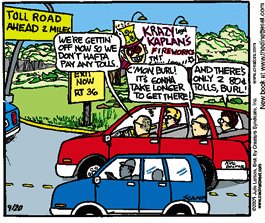Cato Institute is gutless and inconsistent: why aren't they calling for an increase in gasoline excise taxes to end the subsidies to automobile users

There is a big hullaballoo about the Bikestation in DC started by the Cato Institute ("Government Pays $4 Million for a Bike Rack") which was called to task by Matt Yglesias ("Bike/Ped Safety Funds Survive Senate Vote"--he said what about parking structures, where's your outrage?). Cato responded ("Response to Matthew Yglesias re: Uncle Sam’s $4 Million Bike Rack") by saying that they would denounce federal funding of projects including parking structures, on private property.
But here's the thing that bugs the s*** out of me... Automobile use is massively subsidized in (at least) two ways.
1. Roads are paid for by gasoline excise taxes, registration fees, tolls AND GENERAL TAX MONIES. Revenues from gasoline taxes, fees, and tolls pay about 60% of the cost of roads.

Dinette Set by Julie Larson, 9/20/2009, frame 2. Getting off the highway to avoid tolls.
According to Professor Martin Wachs of Berkeley, gasoline taxes pay for 35% of the cost of roads (see this column by Neal Peirce from 2003, "GAS TAX HIKES: NEEDED BUT POLITICALLY PERILOUS").
Federal excise taxes for gasoline haven't been raised SINCE 1994!
Sure it would stink when I use a car to have to pay more money for gas, BUT TALK ABOUT A MASSIVE SUBSIDY--ALL THOSE AUTOMOBILE USERS NOT PAYING THE FULL COST OF THEIR USE OF ROADS, GETTING SUBSIDIZED BY TAXES....
Where's the Cato Institute on this issue?
The New York Times has more guts than the Cato Institute to take this issue on, and newspapers are beholden to automobile advertising. See the recent editorial, "Real Men Tax Gas."
2. Free Parking or very very cheap parking. As long as parking is provided for free or at low cost, driving is subsidized and people don't pay their own way, driving is over-encouraged, and it makes it extremely difficult for transit to be competitive (studies in Minnesota and Montgomery County, Maryland found that free automobile parking is the biggest reason why people won't consider transit to get to work).
And residential parking is an issue too. In a city like Washington, where residential street parking permits cost less than $20/year, for a space that is worth upwards of $2,000 were it on private property.
(Note that people with off-street parking wouldn't be subject to increases, were the city to increase the cost. Therefore, I can see doing an annual "car tax" like the reviled personal property tax in Virginia, to better capture the costs resulting from providing the roads and brides and parking spaces necessary to support automobility.)
But all those free parking spots at work, at the shopping center, etc., encourage driving and discourage making better decisions about where to live, work, and shop.
C'mon Cato Institute, show some intellectual fortitude and consistency.

Labels: bicycling, car culture and automobility, infrastructure, parking and curbside management, public finance and spending, transportation planning



1 Comments:
Thank you for providing such valuable information and thanks for sharing this Business Promotion technique.
Post a Comment
<< Home